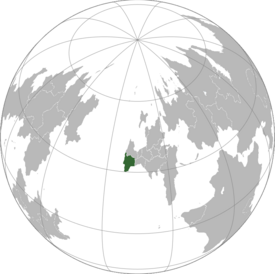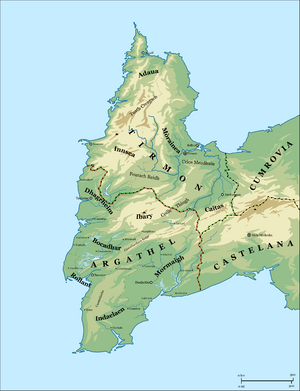User:Finium/Sandbox8
Republic of Argathel Poblacht an Glennargath | |
|---|---|
 Location of Argathel | |
| Capital and largest city | Dunbeithe |
| Demonym(s) | Argathic |
| Government | Semi-Presidential Republic |
• President | Aulay Ketelglenn |
• Vice President | Craig Wreit |
• Chairman | Amarach Ceilog |
| Legislature | Public Directories |
| Establishment | |
• Perendite Bill of Loyalty | 1533 |
• Decameralisation | 1910 |
• Sovereign default | 2002 |
| Population | |
• 2020 estimate | 16,981,213 |
• 2002 census | 18,209,322 |
Argathel is a nation in Bauressia, bordering Irmont to the north and Astelanac to the east.
Argathel was inhabited by pseudo-pannager Insular Auressians by approximately 40,000 before present and later developed into a non-linear pottery culture. Cereal farming had several false starts in Argathel because of the widespread wetlands, which both provided easy access to food for knowledgeable gatherers and made farming difficult without intensive irrigation. Eventually, however, the widespread planting of fruiting trees by local inhabitants successfully created stable enough environments for small-scale glade agriculture. The Glade Clearing Culture existed from approximately 6000-1000 BCE and were slowly assimilated or replaced by Old Ghaels, who were the primary population in Argathel west of Carmacia by 800 BCE. Argathel, along with Irmont, was historically incorporated into the Sabarine territory of Fuoriterra, although Argathel spent more time under imperial rule and less time in revolt than the northern parts of that territory.
In 2002, Argathel defaulted on its sovereign debt and had its finances restructured by an international coalition with support from the Confederacy and Albrennia. As a part of the plan to eliminate Argathel's public debt, foreign and domestic advisors formed a new commission to advise the government. Some of those suggestions included a reduction in public allowances for small-scale farming, which both composed a disproportionate sector of the population, but also contributed to other public costs such as free healthcare in rural areas and landbanking, which was a traditional activity of the state. The ongoing crisis and international intervention in the economy has greatly restricted the government and their ability to act at home and abroad; some commentators consider Argathel to be a colony of the Invisible Empire.
History
- Antiquity
- 800 BCE Old Ghaels complete their colonization of Fuoriterra (Bancarn is abandoned)
- 600 BCE Fortress of Cathairon is established by the Ghaels at their border
- 400 BCE Cathairon is destroyed by the Caitasi who expand northwards
- 350 BCE Caitasi colonize the Boiran foothills and establish a kingdom in Fionglennfhada/Fingliffard
- 100 BCE First Sabarine incursions, conquest of Caitasi and Mormaigh; Carmacia is built as a new capital for the governor of Riania
- 40 BCE Sabarine conquest of eastern Mòrainea, Peace of Ùrraon
- 10 BCE Saberina conquest of Indaelaen and Rollant; Bancarn is rebuilt
- 20 CE Sabarian governor at Bancarn begins extracting tribute from Bocadhar
- 100 CE Sabarine conquest of Mòrainea and Innsea
- 300 CE Sabarine conquest of Adaua
- 475 CE Sabarine withdrawal from Fuoriterra
- Middle Ages
- 600 CE 2nd Sabarine conquest of Indaelaen; Cargloine is razed
- 700 CE 2nd Sabarine conquest of Mòrainea and Innsea
- 800 CE 2nd Sabarine conquest of Adaua
- Early Modern
- 1500 CE Ghàel rebellion, 33 Dark Years
- 1533 CE Hegemony of Mòrainea
- 1799 CE War of the Siarach League
- Modern
- 1912 Tirmon Socialist revolution


